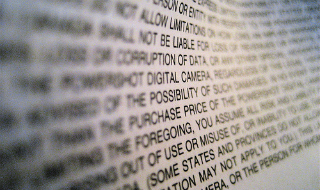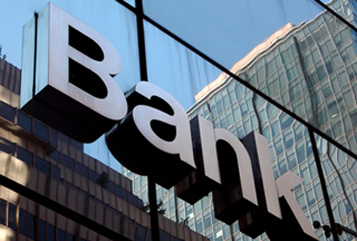Tag Archives: Banks
9-In-10 Big Banks Strip Customers Of Their Right To Jury Trial
by Chris Morran, Consumerist

Researchers at the Pew Charitable Trusts … looked at the customer contracts for checking accounts at 44 of the nation’s largest banks and found that 91% of them include jury trial waivers. Read More ›
From Credit Cards To Mail-Order Steaks: 87 Companies That Are Taking Away Your Right To Sue
by Chris Morran, Consumerist

A recent study by the Consumer Financial Protection Bureau found that even though most Americans have at least one financial product — checking accounts, credit cards, loans, investment accounts — that use forced arbitration clauses to strip the account-holder of their right to sue, very few of us know about these restrictions or understand what they mean. Read More ›
The 3 Myths Banks Are Using To Defend Their ‘Get Out Of Jail Free’ Cards
by Chris Morran, Consumerist

Very few lawyers will take on a single consumer’s arbitration dispute because it’s not worth their time. Some arbitration clauses also force the customer into arbitrating their case in a specific venue, so you could have to travel all the way across the country for the possibility of minimal rewards. Arbitration also sets no legal precedent, so even if one customer prevails, another customer might fail using the exact same evidence. Read More ›
Why More Widowed Homeowners Are Struggling To Prevent A Foreclosure
by Andrew Khouri, Los Angeles Times

The state Senate Judiciary Committee [voted] Tuesday on a bill designed to give surviving spouses, domestic partners and children the same protections borrowers have in the Homeowner Bill of Rights, including the right to sue to stop a foreclosure or for economic damages after one occurs. The bill, SB-1150 … would prevent servicers from moving forward with a foreclosure before requesting “reasonable” documentation of the borrower’s death and the identity of the survivor. Read More ›
Online Payday Lenders Could Be Worse Than Traditional Payday Lenders
by Ashlee Kieler, Consumerist

Half of online payday loan borrowers incur an average of $185 in bank penalties because at least one debit attempt by lenders creates an overdraft or fails completely. … In addition to simply extracting money from borrowers’ accounts when payments are due, [the online system] allows lenders to attempt multiple debit transactions against borrowers’ accounts when the first attempt fails. Nearly 18% of borrowers experience multiple failed requests on the same day from the same lender. For an already financially strapped borrower, this can lead to hundreds of dollars’ worth of overdraft fees. Read More ›
Wells Fargo Must Pay $203M To Customers After Supreme Court Rejection
by Ashlee Kieler, Consumerist

In 2010, the judge in the case ordered the bank to pay the $203 million to customers of Wells Fargo who were affected by the overdraft policy between Nov. 2004 and June 2008. … At issue in the appeal to the Supreme Court was whether or not previous courts were right to certify the class action even though the class included individuals who were not harmed by the company’s conduct — in this case Wells Fargo allegedly making misleading statements to checking account customers about how their transactions would be posted and the likelihood that an overdraft would result. Read More ›
Online Lenders Drawing More Scrutiny By Regulators
by James Rufus Koren, Los Angeles Times

Both the state Department of Business Oversight and the [U.S. Consumer Financial Protection Bureau] have turned their attention to so-called marketplace or peer-to-peer lenders — online firms that offer loans to consumers and small businesses, then sell those loans to investors. There are now dozens of such lenders, which use online applications and speedy underwriting systems to issue loans. … That growth has attracted the attention of consumer advocates, who are concerned about how lenders protect customer data and whether they comply with state and federal lending laws. Read More ›
Overdraft Practices Continue To Gut Bank Accounts And Haunt Customers
by Michael Corkery and Jessica Silver-Greenberg, New York Times

The nation’s big consumer banks collected about $11 billion in overdraft fees last year, which accounted for 8 percent of their profits, according to a report by the Consumer Financial Protection Bureau. … Many customers end up confused by how overdrafts work. In their marketing materials, for example, banks present the choice of whether to sign up for overdraft as an offer of “overdraft protection” — a feature many customers thought would automatically deny transactions and shield them from incurring the fees at all. In reality, it is a service authorizing the banks to charge the overdraft fees. Read More ›
ID Theft Puts Privacy And Financial Security Of Medical Patients, Taxpayers – Even Children – At Risk

There were 12.7 million adult victims of identity theft nationwide in 2014, including over 1.5 million in California, according to the California Attorney General’s Office. “My educated guess is that nearly every adult in the U.S. has been affected by at least one breach involving their Social Security number and/or sensitive personal financial information. Most people have likely been affected by more than one breach,” said Beth Givens, Executive Director of the nonprofit Privacy Rights Clearinghouse. Givens predicts health care institution breaches will continue to be big stories in 2016. Other likely targets are educational institutions and government agencies. Read More ›
Wells Fargo To Pay $1.2 Billion Over Bad Government-Backed Mortgages
by ff, Los Angeles Times

If approved by a federal judge, the settlement would close the books on a 2012 lawsuit that the government filed against the bank over bad loans backed by the Federal Housing Administration. … Between 2001 and 2005, prosecutors said, the bank issued thousands of FHA loans that did not meet the program’s requirements, which include minimum incomes and credit scores for borrowers. They also said that from 2002 to 2010, the bank violated federal reporting requirements by keeping problem loans under wraps and collecting insurance payouts when loans went bad. Read More ›
Supreme Court Rejects Class-Action Suit Against DirecTV
by Robert Barnes, Washington Post

“These decisions have predictably resulted in the deprivation of consumers’ rights to seek redress for losses, and turning the coin, they have insulated powerful economic interests from liability for violations of consumer protection laws,” wrote [dissenting Justice Ruth Bader] Ginsburg. … “It has become routine, in a large part due to this court’s decisions, for powerful economic enterprises to write into their form contracts with consumers and employees no class-action arbitration clauses … further degrading the rights of consumers and further insulating already powerful economic entities.” Read More ›
Paris Attacks Spark Another Fight Against Encryption
by Sean Sposito, San Francisco Chronicle

[Encryption “back-doors” for law enforcement] won’t necessarily weaken terrorist organizations’ ability to communicate with each other over the Internet. … But what it could do is make it easier for criminals and terrorists to access our financial, medical and other personal records, said Pam Dixon, the executive director of the World Privacy Forum in San Diego. They might find a way through the back-door as well. “Strong crypto means good security for all of us,” she said. “It means that banks and hospitals can secure financial and other transactions in our digital world.” Read More ›
Beware The Fine Print: Arbitration Everywhere, Stacking The Deck Of Justice
by Jessica Silver-Greenberg and Robert Gebeloff, The New York Times

The move to block class actions was engineered by a Wall Street-led coalition of credit card companies and retailers, according to interviews with coalition members and court records. Strategizing from law offices on Park Avenue and in Washington, members of the group came up with a plan to insulate themselves from the costly lawsuits. Their work culminated in two Supreme Court rulings, in 2011 and 2013, that enshrined the use of class-action bans in contracts. The decisions … upended decades of jurisprudence. Read More ›